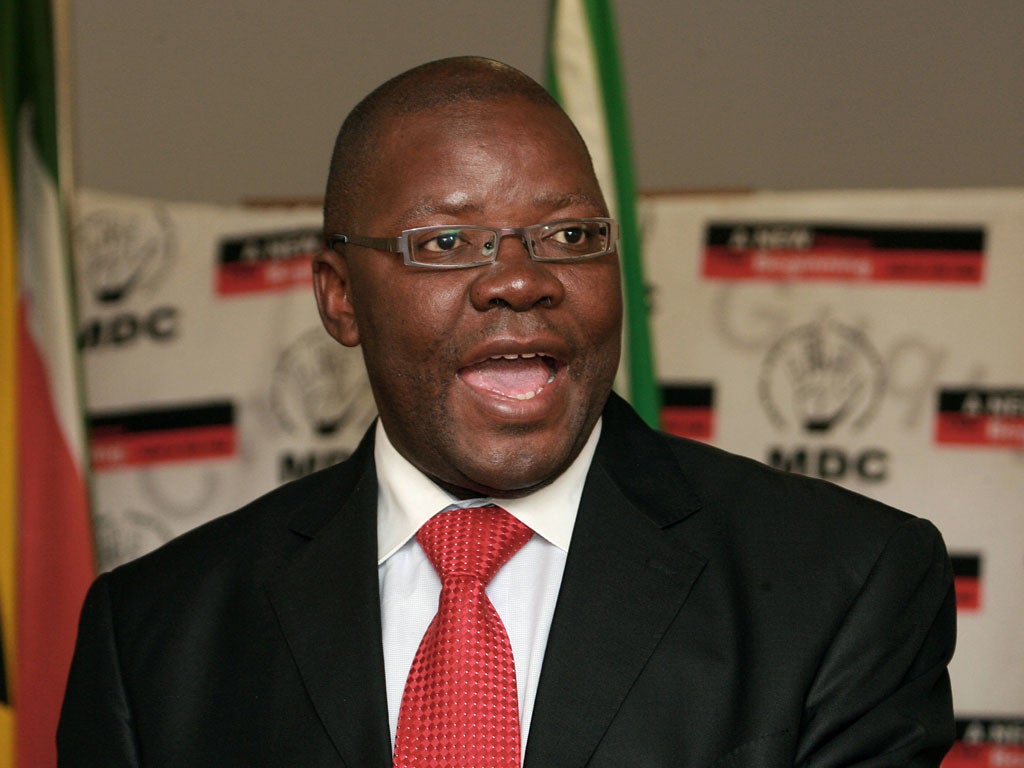Mugabe will cling to power until the last, says minister
Politician tells Alex Duval Smith in Harare why President will never quit

Your support helps us to tell the story
From reproductive rights to climate change to Big Tech, The Independent is on the ground when the story is developing. Whether it's investigating the financials of Elon Musk's pro-Trump PAC or producing our latest documentary, 'The A Word', which shines a light on the American women fighting for reproductive rights, we know how important it is to parse out the facts from the messaging.
At such a critical moment in US history, we need reporters on the ground. Your donation allows us to keep sending journalists to speak to both sides of the story.
The Independent is trusted by Americans across the entire political spectrum. And unlike many other quality news outlets, we choose not to lock Americans out of our reporting and analysis with paywalls. We believe quality journalism should be available to everyone, paid for by those who can afford it.
Your support makes all the difference.President Robert Mugabe "will never step down", Zimbabwe's Finance Minister told The Independent, creating an image of a lonely man with few interests outside politics, and a determination to cling to power to the bitter end.
Tendai Biti of the Movement for Democratic Change, who entered the government in 2009 as part of a power-sharing deal with Mr Mugabe's Zanu-PF, said he felt "pity" for the 88-year-old President, who is criticised for human rights abuses and the slow pace of democratic reform.
"After 32 years in power, he knows nothing else," Mr Biti said. "I know the joy of walking into a supermarket, watching the Black Rhinos [football club] or going to church without anyone raising a furore. He does not know there is a beautiful life outside politics. He would never want to retire. I think he will never step down."
Mr Biti, a 45-year-old lawyer who is deputy to Prime Minister Morgan Tsvangirai in the MDC, also launched a spirited defence of his party's record in government. He rejected suggestions that his party had lost credibility by cosying up to Zanu-PF, which entered the fragile coalition with the MDC after disputed, violence-plagued elections in 2008. But the power sharing has proved bitter and fractious.
"We have not stolen money. Zanu-PF has tried to trap us. There are many temptations in politics. They have thrown everything at us except incest," Mr Biti said in an interview in Harare.
"The people of Zimbabwe know that we are the party that has given them time-out [economically]. The past 39 months have shown that we are nobody's puppets and we are ready to govern on the basis of a simple decision-making matrix: what is best for our people and the country."
International donors refuse to pay aid directly to the Zimbabwean treasury. As a result, Mr Biti presides over a peppercorn budget of US$4bn (£2.5bn), 70 per cent of which he spends on civil servants' salaries.
He said the country's new diamond field, Marange, had brought in only $19m to the treasury since the beginning of the year, whereas he had expected $77m.
Human rights groups have expressed concern that Mr Mugabe's party plans to use the proceeds from diamond mines to fund violence and intimidation in upcoming elections – accusations denied by Zanu-PF.
Mr Biti said the country urgently needed to put in place structures – such as a state diamond exploration company – to ensure that "those diamonds sweat for us and not for thieves and middlemen".
Under the deal that followed the disputed elections in 2008, Zimbabwe is expected to move towards fair elections. But the process of writing a new constitution has become mired in infighting. President Mugabe has suggested he will call elections with or without a new constitution.
This month, Mr Biti said elections probably could not be held this year because the state coffers were too low. Mr Mugabe had reportedly insisted "money has to be found". Mr Mugabe is currently slated to be the sole presidential candidate in the elections.
Mr Biti repeated the MDC's call for international sanctions to be lifted, and criticised the Obama administration. He suggested the US should apply the same "constructive engagement" policies – sweeteners rather than sanctions – that were used by the Reagan administration in its dealings with apartheid South Africa. "When you have a difficult situation you must engage," he said. "Some countries are refusing to engage. Their approach is primitive and amateurish."
Subscribe to Independent Premium to bookmark this article
Want to bookmark your favourite articles and stories to read or reference later? Start your Independent Premium subscription today.
Join our commenting forum
Join thought-provoking conversations, follow other Independent readers and see their replies
Comments